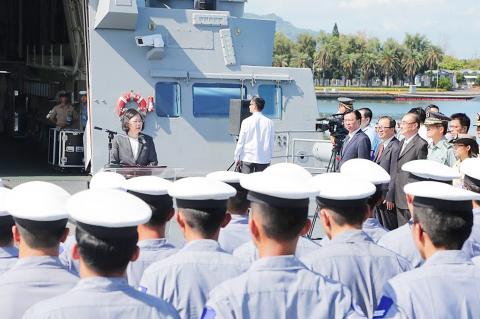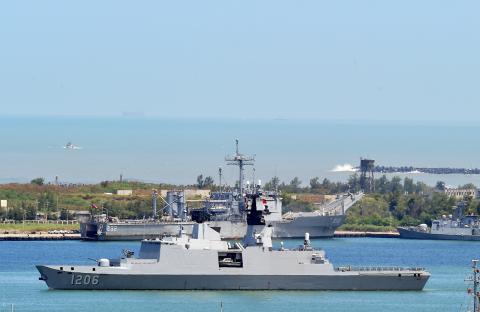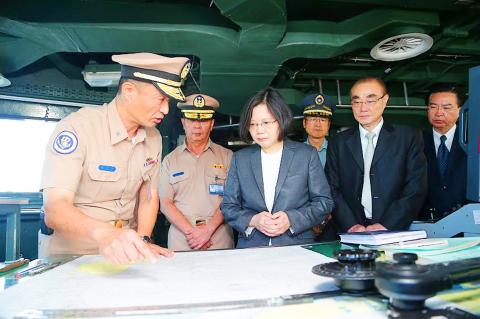President Tsai Ing-wen (蔡英文) yesterday vowed to demonstrate the nation’s determination to safeguard its national interests as she boarded a Kang Ding-class frigate at the naval port in Kaohsiung’s Zuoying District (左營) ahead of its mission in the disputed South China Sea.
“Today [Wednesday], the Kang Ding-class frigate Dyi-huah is to embark on a patrol mission in the South China Sea,” Tsai said in a morning speech to the crew of the frigate. “The mission was moved forward by one day and carries particular significance, as new developments occurred in the region yesterday [Tuesday].”
Tsai said a ruling handed down by the Permanent Court of Arbitration in The Hague, Netherlands, on Tuesday, especially the part pertaining to Itu Aba Island (Taiping Island, 太平島), constituted a severe impairment of the nation’s rights regarding its islands and territorial waters in the South China Sea.

Photo: courtesy of the Ministry of National Defense
“This frigate represents the Republic of China. The uniforms you wear represent the public’s trust in you,” Tsai said. “As for this mission, it is aimed at demonstrating Taiwanese determination to defend our national interests.”
A paragraph in the court’s ruling states that all of the high-tide features in the Spratly Islands (Nansha Islands, 南沙群島) — which Taiwan claims — including Itu Aba, are legally “rocks” that do not generate an exclusive economic zone or continental shelf.
The government has refused to recognize the ruling and deemed it as having no legal effect on the nation on the grounds that Taiwan was not invited to participate in the arbitration process, nor was it consulted about its opinions.

Photo: Chang Chung-yi, Taipei Times
Tsai’s presence on the warship was apparently prompted by the downgrading of Itu Aba, the largest naturally occurring island in the Spratly Islands, which has been administered by Taiwan since 1956.
It is also claimed by Vietnam, the Philippines and China.
The president was accompanied by National Security Council Secretary-General Joseph Wu (吳釗燮), Minister of National Defense Feng Shih-kuan (馮世寬), Chief of General Staff Yen De-fa (嚴德發), National Security Council Deputy Secretary-General York Chen (陳文政) and Naval Commander Huang Shu-kuang (黃曙光).

Photo courtesy of the Ministry of National Defense
Tsai said that it has been the nation’s long-standing stance that South China Sea disputes should be settled peacefully via multilateral negotiations.
“On the foundation of equal negotiations, we are also willing to join hands with other parties to promote peace and stability in the region,” Tsai said.
The president urged the armed forces to strive for their dignity, which she said does not fall from the sky, but must be earned gradually through implementation of discipline and development of professionalism.
“Now, a greater mission has fallen upon your shoulders,” Tsai said, urging the navy to put its skills to use and sail to the South China Sea to safeguard the nation’s interests.

‘TAIWAN-FRIENDLY’: The last time the Web site fact sheet removed the lines on the US not supporting Taiwanese independence was during the Biden administration in 2022 The US Department of State has removed a statement on its Web site that it does not support Taiwanese independence, among changes that the Taiwanese government praised yesterday as supporting Taiwan. The Taiwan-US relations fact sheet, produced by the department’s Bureau of East Asian and Pacific Affairs, previously stated that the US opposes “any unilateral changes to the status quo from either side; we do not support Taiwan independence; and we expect cross-strait differences to be resolved by peaceful means.” In the updated version published on Thursday, the line stating that the US does not support Taiwanese independence had been removed. The updated

‘CORRECT IDENTIFICATION’: Beginning in May, Taiwanese married to Japanese can register their home country as Taiwan in their spouse’s family record, ‘Nikkei Asia’ said The government yesterday thanked Japan for revising rules that would allow Taiwanese nationals married to Japanese citizens to list their home country as “Taiwan” in the official family record database. At present, Taiwanese have to select “China.” Minister of Foreign Affairs Lin Chia-lung (林佳龍) said the new rule, set to be implemented in May, would now “correctly” identify Taiwanese in Japan and help protect their rights, the Ministry of Foreign Affairs said in a statement. The statement was released after Nikkei Asia reported the new policy earlier yesterday. The name and nationality of a non-Japanese person marrying a Japanese national is added to the

AT RISK: The council reiterated that people should seriously consider the necessity of visiting China, after Beijing passed 22 guidelines to punish ‘die-hard’ separatists The Mainland Affairs Council (MAC) has since Jan. 1 last year received 65 petitions regarding Taiwanese who were interrogated or detained in China, MAC Minister Chiu Chui-cheng (邱垂正) said yesterday. Fifty-two either went missing or had their personal freedoms restricted, with some put in criminal detention, while 13 were interrogated and temporarily detained, he said in a radio interview. On June 21 last year, China announced 22 guidelines to punish “die-hard Taiwanese independence separatists,” allowing Chinese courts to try people in absentia. The guidelines are uncivilized and inhumane, allowing Beijing to seize assets and issue the death penalty, with no regard for potential

‘UNITED FRONT’ FRONTS: Barring contact with Huaqiao and Jinan universities is needed to stop China targeting Taiwanese students, the education minister said Taiwan has blacklisted two Chinese universities from conducting academic exchange programs in the nation after reports that the institutes are arms of Beijing’s United Front Work Department, Minister of Education Cheng Ying-yao (鄭英耀) said in an exclusive interview with the Chinese-language Liberty Times (the Taipei Times’ sister paper) published yesterday. China’s Huaqiao University in Xiamen and Quanzhou, as well as Jinan University in Guangzhou, which have 600 and 1,500 Taiwanese on their rolls respectively, are under direct control of the Chinese government’s political warfare branch, Cheng said, citing reports by national security officials. A comprehensive ban on Taiwanese institutions collaborating or